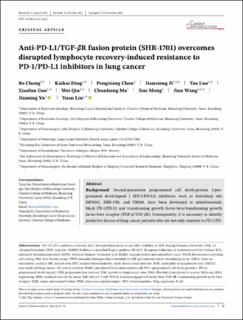| dc.contributor.author | Cheng, Bo | |
| dc.contributor.author | Ding, Kaikai | |
| dc.contributor.author | Chen, Pengxiang | |
| dc.contributor.author | Ji, Jianxiong | |
| dc.contributor.author | Luo, Tao | |
| dc.contributor.author | Guo, Xiaofan | |
| dc.contributor.author | Qiu, Wei | |
| dc.contributor.author | Ma, Chunhong | |
| dc.contributor.author | Meng, Xue | |
| dc.contributor.author | Wang, Jian | |
| dc.contributor.author | Yu, Jinming | |
| dc.contributor.author | Liu, Yuan | |
| dc.date.accessioned | 2022-08-12T11:39:00Z | |
| dc.date.available | 2022-08-12T11:39:00Z | |
| dc.date.created | 2022-05-09T15:15:23Z | |
| dc.date.issued | 2022 | |
| dc.identifier.issn | 2523-3548 | |
| dc.identifier.uri | https://hdl.handle.net/11250/3011635 | |
| dc.description.abstract | Background
Second-generation programmed cell death-protein 1/programmed death-ligand 1 (PD-1/PD-L1) inhibitors, such as bintrafusp alfa (M7824), SHR-1701, and YM101, have been developed to simultaneously block PD-1/PD-L1 and transforming growth factor-beta/transforming growth factor-beta receptor (TGF-β/TGF-βR). Consequently, it is necessary to identify predictive factors of lung cancer patients who are not only resistant to PD-1/PD-L1 inhibitors but also sensitive to bifunctional drugs. The purpose of this study was to search for such predictors.
Methods
Multivariable Cox regression was used to study the association between the clinical outcome of treatment with PD-1/PD-L1 inhibitors and lymphocyte recovery after lymphopenia in lung cancer patients. Murine CMT167 lung cancer cells were engineered to express the firefly luciferase gene and implanted orthotopically in the lung of syngeneic mice. Bioluminescence imaging, flow cytometry, and immunohistochemistry were employed to determine response to immunotherapy and function of tumor-infiltrating immune cells.
Results
For lung cancer patients treated with anti-PD-1/PD-L1 antibodies, poor lymphocyte recovery was associated with a shorter progression-free survival (PFS; P < 0.001), an accumulation of regulatory T cells (Tregs), and an elimination of CD8+ T cells in the peripheral blood. Levels of CD8+ T cells and Treg cells were also imbalanced in the tumors and peripheral immune organs of mice with poor lymphocyte recovery after chemotherapy. Moreover, these mice failed to respond to anti-PD-1 antibodies but remained sensitive to the anti-PD-L1/TGF-βR fusion protein (SHR-1701). Consistently, SHR-1701 but not anti-PD-1 antibodies, markedly enhanced IFN-γ production and Ki-67 expression in peripheral CD8+ T cells from patients with impaired lymphocyte recovery.
Conclusions
Lung cancer patients with poor lymphocyte recovery and suffering from persistent lymphopenia after previous chemotherapy are resistant to anti-PD-1/PD-L1 antibodies but might be sensitive to second-generation agents such as SHR-1701. | en_US |
| dc.language.iso | eng | en_US |
| dc.publisher | Wiley | en_US |
| dc.rights | Attribution-NonCommercial-NoDerivatives 4.0 Internasjonal | * |
| dc.rights.uri | http://creativecommons.org/licenses/by-nc-nd/4.0/deed.no | * |
| dc.title | Anti-PD-L1/TGF-βR fusion protein (SHR-1701) overcomes disrupted lymphocyte recovery-induced resistance to PD-1/PD-L1 inhibitors in lung cancer | en_US |
| dc.type | Journal article | en_US |
| dc.description.version | publishedVersion | en_US |
| dc.rights.holder | Copyright 2022 The Author(s) | en_US |
| cristin.ispublished | true | |
| cristin.fulltext | original | |
| dc.identifier.doi | https://doi.org/10.1002/cac2.12244 | |
| dc.identifier.cristin | 2022809 | |
| dc.source.journal | Cancer Communications | en_US |
| dc.source.pagenumber | 17-36 | en_US |
| dc.identifier.citation | Cancer Communications. 2022, 42 (1), 17-36. | en_US |
| dc.source.volume | 42 | en_US |
| dc.source.issue | 1 | en_US |

